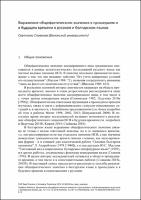Chapter Выражение общефактического значения в прошедшем и в будущем времени в русском и болгарском языках
| dc.contributor.author | Slavkova, Svetlana | |
| dc.date.accessioned | 2022-06-01T12:08:05Z | |
| dc.date.available | 2022-06-01T12:08:05Z | |
| dc.date.issued | 2018 | |
| dc.identifier | ONIX_20220601_9788864537238_74 | |
| dc.identifier.issn | 2612-7679 | |
| dc.identifier.uri | https://library.oapen.org/handle/20.500.12657/55891 | |
| dc.description.abstract | The paper analyses the general factual value of the imperfective verbs in Russian and Bulgarian. The first part examines the three main types of the general factual meaning in the past (‘referential’, ‘existential’, and ‘atelic’). We show that in Bulgarian these meanings are rendered by imperfective verbs in the aorist, perfect, and imperfect tense respectively. The second part is dedicated to the future tense. In Russian, the general factual reading of the analytical future has many restrictions while in Bulgarian the general factual meaning is the main meaning of the imperfective future. | |
| dc.language | Russian | |
| dc.relation.ispartofseries | Biblioteca di Studi Slavistici | |
| dc.subject.other | Bulgarian | |
| dc.subject.other | Russian | |
| dc.subject.other | Imperfective | |
| dc.subject.other | General Factual Meaning | |
| dc.subject.other | Future Tenses | |
| dc.title | Chapter Выражение общефактического значения в прошедшем и в будущем времени в русском и болгарском языках | |
| dc.type | chapter | |
| oapen.identifier.doi | 10.36253/978-88-6453-723-8.12 | |
| oapen.relation.isPublishedBy | bf65d21a-78e5-4ba2-983a-dbfa90962870 | |
| oapen.relation.isbn | 9788864537238 | |
| oapen.series.number | 40 | |
| oapen.pages | 17 | |
| oapen.place.publication | Florence |

